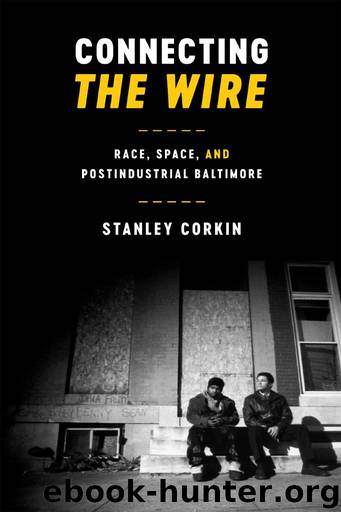Connecting The Wire: Race, Space, and Postindustrial Baltimore (Texas Film and Media Studies) by Stanley Corkin

Author:Stanley Corkin [Corkin, Stanley]
Language: eng
Format: azw3
Publisher: University of Texas Press
Published: 2017-02-14T05:00:00+00:00
Season 4, episode 5, “Not special dead, just dead.”
The world that Simon portrays calls out for some historical context, since his ghetto locale has hardened and calcified, exhibiting its own ecology and seeming to offer few ways of escaping from it. By dramatizing this spatial system of constrained lives and economic opportunity, Simon rebuts the concept that the twenty-first century marks the onset of the postracial era. Indeed, the history and fact of economic and spatial segregation—and now, in the neoliberal era of hypersegregation—shows that the legacy of race has a life that extends far beyond its apparent legal dismantling. Since urban education remains a vexed and infinitely discussed issue of this era, The Wire’s complex dramatization of it provides a trenchant further commentary.6
THE ECOLOGY OF THE GHETTO
How you expect to run with the wolves come night when you spend all day sporting wit’ the puppies?
OMAR
The production and reproduction of knowledge tends to be place-specific, however far-flung that space. A central discourse of globalized commerce is that of cosmopolitanism, a vision of knowledge that distends its spatial application. Cosmopolitanism’s other is a kind of narrow tribalism, a vision of knowing that is far more geographically circumscribed. Such notions of circumscribed space bring to mind earlier versions of capitalism, a system of commerce that was narrowly bound by the technological limits of travel and communication, although even nineteenth-century commerce had a vision of international circulation. That earlier model was primarily focused on the national and subnational production and circulation of commodities and the accumulation of wealth. Arguably, it was at the point when commerce began to look more resolutely beyond the local or regional, in the late nineteenth century, that ideologies of extreme nationalism and localism developed their particular hold on a general public. Visions of nation and affiliation were necessarily derived from a need to reaffirm the local and affirm affiliation within a distinct geography just as that sense of the inviolability of borders was beginning to be contested. Simon shows this process as recursive within The Wire. We see in this season the need to affirm the smallness and self-contained nature of specific places: the west side of Baltimore over the east, or Baltimore over New York, for example.
As an effect of this sense of space and affiliation, as well as through the limits of wealth, class, and opportunity, The Wire delineates the terms of ghetto life in Baltimore, showing us in dramatic detail a self-contained sector of that city. In doing so, it develops a detailed sociological view of a region working in relative isolation. In season 2 we saw the waterfront defined as an island that projects into the world beyond, but remains a discrete space with its own specific social definitions. In season 3 we saw Colvin defining a region within the region. In season 4 we see the pervasive effects of the world as a closed system. In such a self-contained space, which is to some degree constrained from without and to some degree—and ideologically—constrained
Download
This site does not store any files on its server. We only index and link to content provided by other sites. Please contact the content providers to delete copyright contents if any and email us, we'll remove relevant links or contents immediately.
| Coloring Books for Grown-Ups | Humor |
| Movies | Performing Arts |
| Pop Culture | Puzzles & Games |
| Radio | Sheet Music & Scores |
| Television | Trivia & Fun Facts |
Robin by Dave Itzkoff(2437)
Head of Drama by Sydney Newman(2297)
I'm Judging You by Luvvie Ajayi(2202)
The Paranormal 13 (13 free books featuring witches, vampires, werewolves, mermaids, psychics, Loki, time travel and more!) by unknow(2091)
Ten by Gretchen McNeil(1884)
Single State of Mind by Andi Dorfman(1809)
#MurderTrending by Gretchen McNeil(1656)
Key to the Sacred Pattern: The Untold Story of Rennes-le-Chateau by Henry Lincoln(1625)
Merv by Merv Griffin(1610)
Most Talkative by Andy Cohen(1588)
This Is Just My Face by Gabourey Sidibe(1468)
Notes from the Upside Down by Guy Adams(1467)
The Hunger Games: Official Illustrated Movie Companion by Egan Kate(1438)
Springfield Confidential by Mike Reiss(1412)
Binging with Babish by Andrew Rea(1412)
Jamie Oliver by Stafford Hildred(1387)
The TV Writer's Workbook: A Creative Approach To Television Scripts by Ellen Sandler(1347)
Clarkson--Look Who's Back by Gwen Russell(1342)
Blue Planet II by James Honeyborne & Mark Brownlow(1282)
